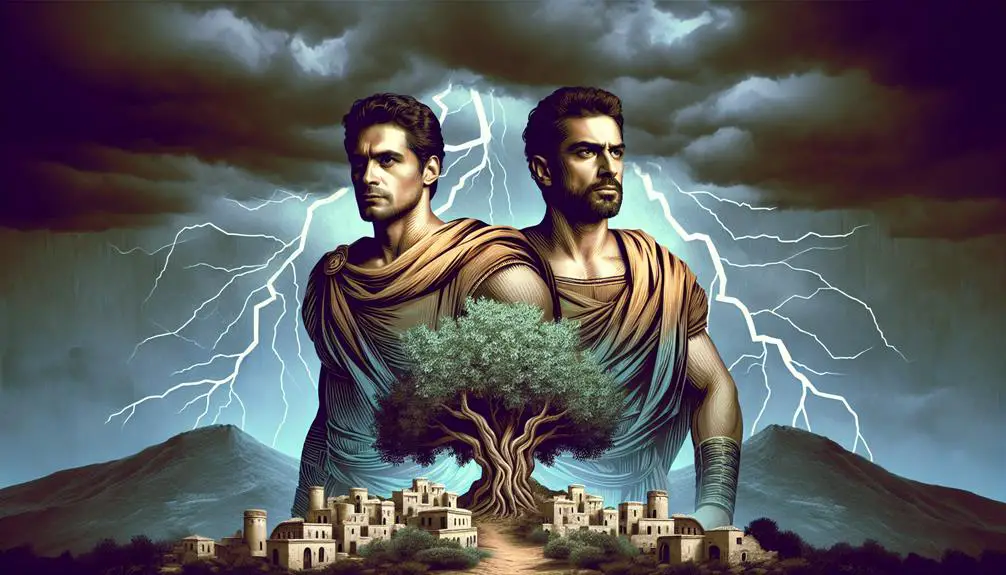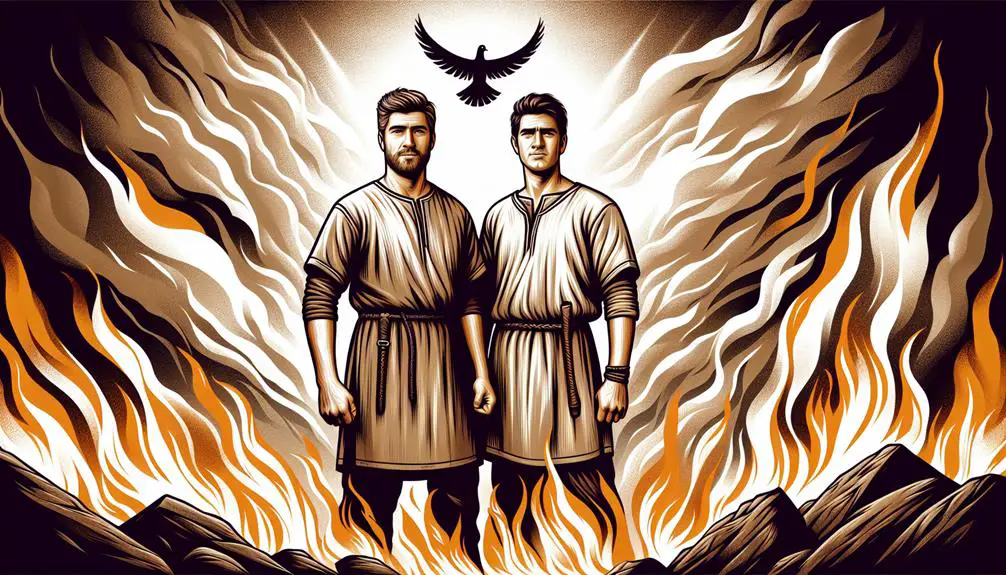Uncover the profound implications behind 'Boanerges,' a nickname given by Jesus, revealing the fiery spirit and legacy of two biblical figures.

Boanerges in the Bible
In the Bible, names hold power and meaning; they tell stories and reveal character. When you encounter the term 'Boanerges,' you're stepping into a narrative rich with symbolism and significance. This nickname, bestowed upon James and John by Jesus, translates to 'sons of thunder'—a title that encapsulates their fiery spirit and pivotal role within the New Testament.
But what lies beneath the surface of this moniker? By exploring its origins and implications, you'll uncover layers of meaning that might change how you view these figures and their legacy. The question, then, is not what 'Boanerges' means, but why Jesus chose it, and the answer promises to be enlightening.
Key Takeaways
- 'Boanerges' symbolizes the fiery spirit and divine calling of James and John, enhancing Jesus' ministry.
- The term reflects their roles as transformative figures in the early Christian movement.
- It highlights the significance of names in biblical narratives, revealing deeper layers of meaning.
- James and John's legacy as 'Boanerges' underlines the importance of zeal and commitment in following Jesus.
The Origin of 'Boanerges

The term 'Boanerges,' originating from the New Testament of the Bible, denotes an Aramaic epithet that Jesus Christ bestowed upon the sons of Zebedee, James and John, symbolizing 'Sons of Thunder.' This naming convention, deeply rooted in the Aramaic language, underscores the significance of names in biblical narratives and their intrinsic meanings. Aramaic, prevalent during Jesus' time, served as a lingua franca across the Middle East, imbuing names with profound cultural and spiritual implications.
You'll find that in the context of Boanerges, the choice of language is pivotal. Aramaic, with its rich expressions and nuances, enabled Jesus to convey a powerful metaphorical message through the designation. The epithet 'Sons of Thunder' isn't merely a label but a reflection of James and John's zealous personalities and potential roles within Jesus' ministry. This naming practice aligns with the broader biblical tradition where names often encapsulate character traits, destinies, or divine revelations.
Further analysis reveals that such naming conventions aren't arbitrary. They're deeply embedded in the cultural and religious fabric of the society. In bestowing the name Boanerges, Jesus leverages the Aramaic language's capacity to express complex ideas succinctly, highlighting the brothers' strengths and perhaps their challenges. This act of naming thus serves multiple functions: it identifies, characterizes, and integrates James and John within the narrative framework, offering insights into their contributions to Jesus' mission.
Significance in Jesus' Ministry

By bestowing the title Boanerges upon James and John, Jesus not only highlighted their intrinsic qualities but also underscored their pivotal role within his ministry, setting a precedent for understanding the dynamic interplay between personal attributes and divine purpose. This appointment wasn't merely a nod to their zeal; it was a strategic move, integrating their fiery spirit with the broader objectives of miraculous healings and parable teachings, which were central to Jesus' mission on earth.
Aspect |
Influence on Ministry |
Connection to Boanerges |
|---|---|---|
Miraculous Healings |
Demonstrated divine authority |
Amplified by their bold faith |
Parable Teachings |
Facilitated spiritual insights |
Enriched by their passionate delivery |
Discipleship Dynamics |
Fostered unity and growth |
Challenged and refined by their intensity |
Public Perception |
Shaped the ministry's image |
Enhanced by their compelling zeal |
James and John's designation as Boanerges, therefore, wasn't just about their temperament but how their character traits were harnessed to advance Jesus' ministry. Their readiness to embrace challenges complemented Jesus' mission, bringing miraculous healings and profound parable teachings to the forefront of their collective endeavor. This synergy between personal attributes and divine calling not only enriched their immediate community but also left an enduring impact on the trajectory of Christian ministry. Their story serves as a powerful illustration of how individual qualities, when aligned with a higher purpose, can significantly influence the course of a spiritual movement, making the Boanerges an integral part of the mosaic of Jesus' ministry.
James and John's Fiery Spirit

Exploring James and John's fiery spirit reveals how their intense zeal not only defined their identity as Boanerges but also significantly influenced the dynamics of Jesus' ministry. Their fiery temperament, marked by a readiness to confront and a passion for their beliefs, set them apart among the disciples. This zealous nature was emblematic of their unwavering commitment to their cause, making them pivotal figures in the narrative of the New Testament.
Their fervor wasn't merely an aspect of their personalities; it was a driving force that shaped interactions and decisions within the group. For instance, their willingness to call down fire from heaven to destroy a village that had rejected Jesus demonstrates their intense loyalty and a propensity for taking drastic actions in the face of opposition. While this episode highlighted their impetuousness, it also underscored a raw, unfiltered devotion to their master, illustrating how their zeal could both empower and complicate their roles as disciples.
Moreover, their zealous nature often put them at the forefront of Jesus' teachings and actions. They didn't just passively follow; they actively engaged, questioned, and sometimes even challenged Jesus, showcasing a dynamic that was essential to the development of their characters and the broader message of the Gospel. Their fiery spirit wasn't just a personal trait but a catalyst that provoked critical discussions and reflections on faith, commitment, and discipleship.
In analyzing James and John's contribution to Jesus' ministry, it's clear that their fiery temperament and zealous nature were integral, shaping not only their own destinies but also the trajectory of the early Christian movement.
Implications of the Nickname

You must consider the symbolism behind 'Boanerges' as it encapsulates both the temperament and the divine calling of James and John within the early Christian narrative.
This nickname's influence on the apostles' legacy extends beyond mere characterization, shaping perceptions of their roles and contributions within the Christian tradition.
Examining this moniker allows you to unravel the layers of meaning and its enduring impact on biblical interpretation and ecclesiastical history.
Symbolism Behind "Boanerges
Delving into the symbolism behind 'Boanerges,' it's crucial to understand that this nickname, bestowed upon James and John by Jesus, signifies more than mere temperament but embodies a deeper, theological significance.
- Storm imagery: Reflects the dynamic and transformative power of their ministry, mirroring the unpredictable and sometimes fearsome nature of storms.
- Divine wrath: Highlights the role they'd play in proclaiming God's judgment, serving as vessels through which divine justice could be expressed.
- Authority and power: Implies an endowed authority from Jesus to challenge and uproot spiritual complacency.
- Purification: Storms often cleanse and renew; similarly, their message aimed at purifying the faith of believers.
- Intensity of commitment: Suggests a fervent, unwavering dedication to their mission, akin to the relentless force of a tempest.
Impact on Apostles' Legacy
The nickname 'Boanerges' bestowed upon James and John by Jesus has profoundly shaped their legacy, signifying not just a personal attribute but a divine endorsement of their roles in the early Christian church. This title, translating to 'sons of thunder,' underscores their potent Apostolic Influence, marking them as pivotal figures in spreading the Gospel. It's a testament to their fervor and zeal, qualities that would have been indispensable in the nascent church's expansion.
Moreover, their designation as Boanerges highlights Zebedee's Lineage, imbuing it with a sense of divine favor and distinction. This acknowledgment by Jesus not only elevated James and John's status among the Apostles but also cemented their contributions as foundational to Christian theology and practice, ensuring their remembrance and veneration throughout centuries.
Boanerges in Scriptural Context

You'll find the term 'Boanerges' intricately tied to the identities of the apostles James and John, showcasing a unique facet of their roles within the Gospel narratives.
This designation, translating to 'sons of thunder,' not only encapsulates their zealous personalities but also signals their significance in the broader scriptural landscape.
It's imperative to analyze how this nickname reflects their spiritual journey and contributes to the thematic richness of the New Testament.
Meaning of Boanerges
In Scriptural context, Boanerges, a name given by Jesus to the sons of Zebedee, translates to 'sons of thunder,' reflecting their fiery and zealous nature. This designation isn't just a nickname; it's deeply rooted in the linguistic and cultural practices of the time.
- Nickname etymology: The Aramaic origins of Boanerges offer insight into the personality traits Jesus recognized in James and John.
- Translation accuracy: Scholars have debated the precise translation, but the consensus supports a metaphorical interpretation.
- Cultural significance: This nickname reflects the societal value placed on descriptive, character-revealing names.
- Scriptural implications: The title underscores the intensity and passion of their ministry.
- Linguistic analysis: Understanding Aramaic nuances helps clarify the meaning behind this powerful epithet.
Apostles James and John
Delving into the lives of Apostles James and John, known as Boanerges, reveals their pivotal roles in the early Christian movement and the depth of their character as depicted in biblical narratives.
Zebedee's influence on his sons is undeniable; their upbringing in a fishing family not only honed their physical resilience but also ingrained in them a profound understanding of teamwork and leadership. This background, coupled with their father's guidance, predestined them for significant contributions to the spread of Christianity.
Their transition from fishermen to followers of Jesus symbolizes a transformative journey of faith and dedication. The fishing background, representing their humble origins, contrasts sharply with the monumental legacy they'd eventually establish, highlighting the transformative power of faith and commitment in their lives.
Significance in Gospel
Why do the Gospels bestow the epithet 'Boanerges' upon James and John, and what does this reveal about their character and role within the early Christian narrative? This designation, translating to 'sons of thunder,' underscores their fervent zeal and dynamic presence among Jesus' followers. It's a lens through which we can observe the Disciples' transformation and the intricate Gospel parallels that weave through their stories.
- Gospel parallels highlight their journey from impetuous zealots to pillars of the Church.
- Their transformation signifies the molding of raw zeal into guided purpose.
- Boanerges captures their initial intensity and eventual spiritual maturity.
- This title foreshadows their impactful roles in spreading the Gospel.
- It also underlines the personal growth expected of Jesus' followers.
Legacy of the Thunder Sons

The legacy of the 'Thunder Sons,' James and John, profoundly shapes Christian theological discourse and ecclesiastical traditions through their emblematic zeal and fervor. Their narrative, richly textured with episodes of ambition and humility, casts a long shadow over modern interpretations and cultural representations of apostolic character and mission.
Aspect |
James |
John |
|---|---|---|
Contribution |
First apostolic martyrdom |
Theological writings |
Symbolism |
Zeal leading to sacrifice |
Love and Revelation |
Influence |
Pilgrimage destination |
Mystical theology |
In the realm of modern interpretations, the 'Thunder Sons' serve as dual symbols of the human condition: James embodies the cost of discipleship through his martyrdom, while John epitomizes the depth of divine love and the mystery of revelation. Cultural representations often juxtapose their fiery ambition with their ultimate submission to Christ's message of humility and service, highlighting the transformative power of faith.
Their legacy also punctuates ecclesiastical traditions. James's shrine in Santiago de Compostela remains a beacon for pilgrims, symbolizing the journey of faith as one of both physical and spiritual endurance. John's contributions, particularly the Book of Revelation and his Gospel, furnish the Christian mystical tradition with its foundational texts, inviting believers into deeper contemplation of the divine.
Analyzing their enduring influence, it's evident that James and John, the 'Thunder Sons,' encapsulate the dynamism of Christian discipleship. Their lives, emblematic of zeal tempered by divine love, continue to inspire, challenge, and shape the contours of faith and practice within the Christian tradition.
Frequently Asked Questions
How Has the Term 'Boanerges' Been Interpreted in Various Christian Denominations and Theological Traditions?
You're diving into how 'boanerges' has been interpreted across Christian circles, focusing on its linguistic origins and denominational variations. This term's analysis varies widely, reflecting the rich tapestry of theological traditions.
Some see it as a title of honor, others as a symbolic name with deep spiritual implications. By examining its roots and how different denominations embrace or reinterpret it, you're uncovering layers of meaning, enriching your understanding of Christian doctrinal diversity.
Can 'Boanerges' Be Linked to Any Specific Cultural Practices or Symbols in Early Christian Communities?
You're diving into how specific terms carry symbolic meanings within ancient communities, focusing on their cultural practices.
Are There Any Notable Artworks or Pieces of Literature Inspired by the Story of Boanerges That Have Significantly Impacted Christian Iconography or Theology?
You'll find that artistic interpretations and literary influences inspired by Boanerges have deeply enriched Christian iconography and theology. These works not only illuminate the narrative's richness but also offer profound insights into its spiritual implications.
How Have Modern Biblical Scholars Reconciled Differences in the Depiction of James and John's Characters in the Gospels With Their Nickname 'Boanerges'?
You're diving into how scholars tackle James's ambition and John's transformation in the gospels, contrasting with their 'Boanerges' label. They're weaving historical context and textual analysis together, showing that these traits reflect their growth rather than contradictions.
This approach highlights the complexity of their characters, suggesting that their fiery spirit, symbolized by 'Boanerges,' actually complements their later roles, illustrating a nuanced understanding of their journey from ambition and transformation to leadership.
What Role Does the Concept of 'Boanerges' Play in Contemporary Christian Spirituality or Pastoral Teachings, Especially Regarding Leadership and Zeal in Faith?
Like a catalyst sparking change, the concept of 'Boanerges' influences contemporary Christian spirituality by emphasizing leadership and zeal in faith. It encourages personal transformation, akin to refining fire purifying gold, leading to a more profound commitment to one's beliefs.
This transformation often extends to community outreach, inspiring actions that bridge faith and service. Analytically, 'Boanerges' serves as a model for dynamic, passionate leadership that's both introspective and outward-looking.
Conclusion
In conclusion, the moniker 'Boanerges,' bestowed upon James and John by Jesus, isn't merely a title but a profound reflection of their impassioned nature, emblematic of their role in the nascent Christian movement. This designation, translating as 'Sons of Thunder,' encapsulates their zealous spirit and inherent potential for leadership and transformation within the scriptural narrative.
As we delve into the depths of this term, it's clear that its significance extends beyond a simple nickname, shaping our understanding of biblical character and legacy. Through this lens, the story of Boanerges isn't just about two figures from the past; it's a vibrant, thunderous call resonating through the ages, challenging us to explore the depths of our own faith and commitment.



Sign up